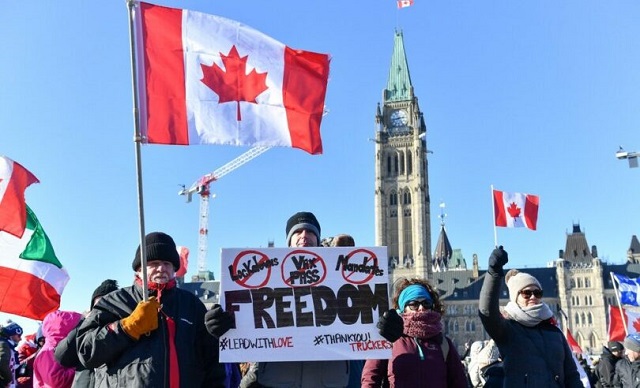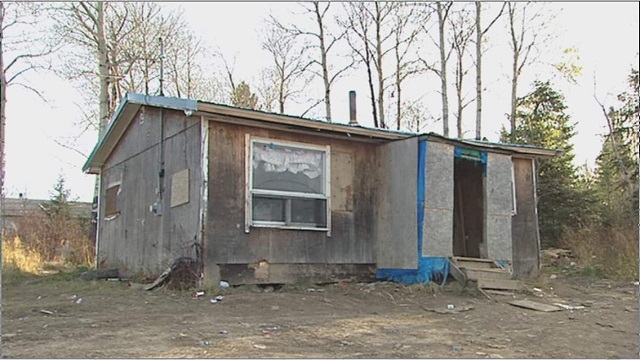Bruce Dowbiggin
Guess Who Doesn’t Believe A Word Trudeau’s Authorities Tell Them Anymore?
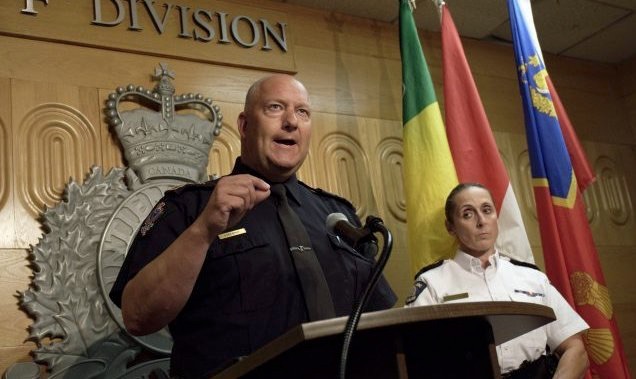
Sign up today for Not The Public Broadcaster newsletters. Hot takes/ cool slants on sports and current affairs. Have the latest columns delivered to your mail box. Tell your friends to join, too. Always provocative, always independent. https://share.hsforms.com/16edbhhC3TTKg6jAaRyP7rActsj5
[UPDATE] The death of Queen Elizabeth II at age 96 is a reminder of values of competence and stoicism that have seemingly evaporated in the age of self awareness and self pity. Bear it in mind with this previously written column.
A Parole Board of Canada decision dated Feb. 1 found that Myles Sanderson would “not present an undue risk,” and freeing him would “contribute to the protection of society”… Sanderson was the subject of a massive police manhunt after 11 people were killed and 19 injured on the James Smith Cree Nation and in Weldon, Sask. He later died in police custody, taking the mystery of his rampage with him.
The grim carnage in Saskatchewan is a tragic bookend to Nova Scotia’s Mass Casualty Commission looking into how a 51-year-old with a record of violence acquired a replica police vehicle, semi-automatic weapons and carried out 22 murders over 13 hours on April 18-19, 2020. In that horrific event, hapless RCMP commissioner Brenda Lucki admitted, “I don’t think we were what you wanted us to be or what you needed us to be.”
Hey, mistakes happen. But disasters take planning. At least, that’s what most Canadians are probably thinking these days about the bumbling performance of their authority figures in the years since Covid-19 crept into the lexicon. Just ask Ottawans how they feel about their police performance when the Trucker Convoy came to town. Not good, huh?

Whether it’s the police, the parole board, health authorities or the public-education apparatus, the resolute Canadian faith in their elected officials and experts has taken a pounding the past three years. While the usual diehards will still wear any mask, have any drug injected into them, many more have flipped an internal switch. Nerves are fraying. Voices are being raised at politicians. Bricks are being thrown. Bricks?
According to the Toronto Star, “Death threats, racist taunts, brick throwing: How a rising tide of toxic abuse is battering Toronto city hall. City officials say over the past two years there’s been an escalation in abuse and threats far beyond the usual heated exchanges.”
In part, the tension has been ratcheted by the lockdown isolation suffered grimly by many Canadians— to no appreciable benefit— and the handy redress to social media to air their grievances or to pound on politicians, police, airline officials and school board officials. The Covid hotels, the barred restaurants and the closed golf courses were but a few of the civil liberties tromped by Trudeau and his NDP allies.
(The fatigue is not exclusive to Canada, of course. In Germany, the political elite gambled on renewable energy to replace fossil fuels and nuclear energy. Bad gamble. The Ukrainian war and the unreliability of solar/ wind now have German citizens— well, all Europeans— facing a winter of freezing discontent while the plutocrats who smirked at Trump scramble for a new scapegoat.)
The balance of credibility in society is a delicate instrument. Which is why the tin-eared ramblings of the prime minister this past week— 90 percent compliance with new experimental drugs every three months this winter OR ELSE he’ll impose new mandates and restrictions— is so unfortunate (and so predictable). If the private jet-setting squib were looking to create civil unrest— a real possibility considering his WEF loyalties— he couldn’t find a better way to invite challenges to his legitimacy.

In Justin Trudeau’s playhouse they are still playing Reset Monopoly, oblivious to the impact utopian politics is having on his fellow citizens. As such he’ll likely be the last to know that, yes, some will still take any witches’ brew he concocts with Big Pharma. But the rest of the nation has evolved in a different direction.
Canadians are now inclined to reject his advice simply because it comes from him and his band of lockdown legionnaires. He’s wasted his political capital with parents who want their kids in school or small business owners who want their employees to return unmasked to the office.
Such is the failure of his Rideau Cottage authority that most people no longer fear the viruses headed their way. They know that healthy people under the age of 60 are 99.98 percent unlikely to die of this Covid. They know children are likewise highly unlikely to get or spread the virus. They know the failed omnipotent promises of previously mandated drugs. “All will be well after one. No, two. Okay, two and a booster. Alright, three or four tops. One booster every three months…”
They’re willing to accept bad cold or flu symptoms so they can have a sane life. And yet the prime minister forges ahead as if his word is enough to make it so. It takes a special form of cognitive dissonance to interfere with RCMP investigations for political purposes but then hold yourself up as an even-handed warrior for justice. Just ask Jody Wilson Raybould how that worked against her.
Unless Trudeau is dreaming of a snap election this fall based on The Science and Canadian people’s fear of the Covid narrative he created. In that case, prepare for Media Party psy-ops and allusions to Nazis. Just don’t expect the cops to come to your rescue.
Bruce Dowbiggin @dowbboy is the editor of Not The Public Broadcaster (http://www.notthepublicbroadcaster.com). A two-time winner of the Gemini Award as Canada’s top television sports broadcaster, he’s a regular contributor to Sirius XM Canada Talks Ch. 167. Inexact Science: The Six Most Compelling Draft YearsIn NHL History, , his new book with his son Evan, was voted the eighth best professional hockey book of by bookauthority.org . His 2004 book Money Players was voted seventh best, and is available via http://brucedowbigginbooks.ca/book-personalaccount.aspx
Bruce Dowbiggin
Coyotes Ugly: The Sad Obsession Of Gary Bettman

It came to this. Playing in the 6,000 seat Mullet Arena on the campus of Arizona State. Owned by a luckless guy who eschewed the public spotlight. Out of the playoffs, their bags packed for who knows where, the Arizona (née Phoenix) Coyotes gave an appreciative wave to the tiny crowd gathered to say Thanks For The Memories.
With that they were history. Although NHL commissioner-for-life Gary Bettman has promised the last in a set of hapless owners that he can revive the franchise for a cool billion should he build the rink that no one was willing to build for the Yotes the past 20 years.
The Arizona Republic said good riddance. “Metro Phoenix lost the Coyotes because we are an oversaturated professional and college sports market with an endless supply of sunshine and recreational choices. Arizona may have dodged a slapshot:
We have the NFL Cardinals, the MLB Diamondbacks, the NBA Suns, MLB spring training, the WM Phoenix Open, the Phoenix Rising, the WNBA Mercury, the Indoor Football League Rattlers and the Arizona State Sun Devils. There hasn’t been a household name on the Coyotes since Shane Doan, and half of Phoenix probably doesn’t know who he was”.
Likely they’ll be a financial success in Salt Lake City where there’s a viable owner, lots of money and a will to make it work. They’ll need a will because— stop me if you’ve heard this before about the Coyotes— the rink they’ll play in this fall has only 12,500 unobstructed views for hockey.
Watching this farce we recalled getting a call from Blackberry co-founder Jim Balsillie in 2008, shortly after our book Money Players was a finalist for the Canadian Business Book of The Year. We’d written a fair bit about the Coyotes in our work and someone had told Balsillie we might be the ones to talk to about a plan he was concocting to buy the bankrupt Coyotes and eventually move them to Hamilton.

Balsillie was salty over the way he’d been used as a stalking horse in the financial troubles of the Pittsburgh Penguins in 1990s. Flush with money from the huge success of RIM, Balsillie offered to buy the Pens, with an eye to moving them to southern Ontario if Pittsburgh didn’t help build a new arena for the team.
In time, Balsillie saw that Bettman was only trying to protect the investment Mario Lemieux and others had in the Pens. Balsillie was the black hat who eventually spooked Pittsburgh into giving the current owners what they wanted. At the end of the day, Mario got his money and Balsillie was given a “thanks for trying”: parting gift of nebulous promises.
Still smarting, Balsille vowed not to be used again. in his desire to bring the NHL to southern Ontario. So when the Coyotes owner Jerry Moyes threw the keys to the team on Bettman’s desk, he saw an opening in the bankruptcy that followed. Seeing Bettman as the impediment, Balsillie decided to buy the team out of bankruptcy, a process the NHL could not legally prevent.
What Balsillie wanted to know was “What then? How would Bettman fight back?” We told him that no one flouts Bettman’s authority within the NHL. (All the current owners since 1993 have come aboard on his watch.) And that he’d have to get the Board of Governors to approve his purchase. Odds: Nil.
That’s what happened. Rather than admit that the Valley of the Sun was poisoned for hockey, Bettman found another series of undercapitalized marks to front the franchise while the league quietly propped up the operation. No longer was the Coyotes’ failure about the fans of Arizona. It was about Gary Bettman’s pride.

Protestors stand outside a press conference in Tempe featuring Arizona Coyotes executives discussing propositions related to a new arena and entertainment district. (Photo by Brooklyn Hall/ Cronkite News)
Where he had meekly let Atlanta move to Winnipeg he fought like hell to save Arizona. And his power. (His obstinacy on U.S. network TV is another story.)
Fast forward to last week and the abject failure of that process. The Arizona Republic naively fawned on Bettman for his many attempts to save the team. In fact, they were just attempts to buttress his grip on the league. While the Coyotes may have been a mess, Bettman has succeeded in preserving the investments of most of the business people who bought his NHL business prospectus.
Sometimes it meant riding into Calgary to chastise the locals for their parsimony in not giving the Flames a new rink. Ditto for Edmonton. Ditto for Winnipeg and other cities. Other times it was to shore up weak partners to protect the equity of other prosperous cities. Sometimes it was to tell Quebec City, “Not gonna’ happen.”
For his loyalty to the owners and through some luck— Gretzky to the Kings— Bettman has made the NHL work in places no one might’ve imagined. Nashville. Raleigh. Tampa. Las Vegas. Dallas. Not at the level of the NFL, NBA or MLB, but at a comfortable equity-affirming status. Nothing happens without his say-so in the NHL. Or without him getting credit. Secondary NHL execs who wanted credit for their innovations were quietly punted.
When Houston finally gets a franchise from Gary they’ll part with $1.5 billion for the honour. While the commissioner has played down new franchises and expanded playoffs, you can bet your last dollar that he’s told owners they’re in line for more expansion cash— cash they don’t have to split with players in collective bargaining.
One more certainty. As long as Bettman rules the NHL you won’t see an NHL team back in Arizona.
Bruce Dowbiggin @dowbboy is the editor of Not The Public Broadcaster A two-time winner of the Gemini Award as Canada’s top television sports broadcaster, he’s a regular contributor to Sirius XM Canada Talks Ch. 167. Inexact Science: The Six Most Compelling Draft Years In NHL History, his new book with his son Evan, was voted the seventh-best professional hockey book of all time by bookauthority.org . His 2004 book Money Players was voted sixth best on the same list, and is available via brucedowbigginbooks.ca.
Bruce Dowbiggin
Why Are Canadian Mayors So Far Left And Out Of Touch?

‘The City of Edmonton pays for a 22-person climate team but doesn’t know who on that team is responsible for what, or what that team has accomplished. Meanwhile, Council takes a pay raise and bumps our property taxes by 8.6%” @michaelistuart
We just returned from a long trip to discover that the City of Calgary wants to potentially re-zone our neighbourhood. Bridle Estates is a collection of 175 bungalow villas for people aged 55-plus. While some people still work most of the inhabitants are retirees. The city’s earnest idea is to create low-cost housing for the tens of thousands arriving here in the city from away.
You can see why a city hall obsessed with white privilege wants to democratize our neck of the south-west corner of the city. Enforced justice has a great tradition. 1970s American cities decided that bussing was the antidote to segregation. After a SCOTUS decision allowing the practice in 1971 (back when liberals owned the court) progressives pushed through an aggressive plan to bus kids from the inner city to the leafy suburbs. And vice versa.
It worked like a charm. For conservatives, that is. It radicalized a generation of voters who soon installed Ronald Reagan as president, and empty buses went back to the depot. The Democrats went from the party of the people to the party people in Hollywood. With time dulling memories, contemporary Woke folk are reviving the integration dream. This time the mostly white suburbs will bear the brunt of the government’s immigration fixation (400K-plus in the third quarter).

There are meetings planned where citizens will be able to address their elected officials— no doubt in a respectful voice. But anyone who’s dealt with Climate Crisis Barbie— Mayor Jyoti Gondek— has much optimism. This is a mayor who exploited a three-way split in centre-right voting here to declare a Climate Emergency on her first day in office.
Then she rolled out hate-speech laws to protect her from being razzed in public. For this and other fabulist blunders— her messing with the new arena project drove a worse deal and a two-year delay in a home for the Calgary Flames— she faced a recall project (which failed to collect over 400K voters’ signatures).
With a housing bubble expanding everyday, Her Tone Deafness has decided that owning a home is so passé. ”We are starting to see a segment of the population reject this idea of owning a home and they are moving towards rental, because it gives them more freedom.” She added that people have become “much more liberated around what housing looks like and what the tenure of housing looks like.”
As the Calgary’s schmozzles and Edmonton’s dabble in climate extravagance illustrate the municipal level of government in Canada is a few lobsters shy of a clambake. Across the country major cities are in the hands of radical NDP soldiers or virtue warriors who would rather have symbols than sewers to talk about.
In Toronto, Jack Layton’s widow Olivia Chow is leveraging her 37 percent mandate to make Toronto a kinder, Wok-er city. In Vancouver and Victoria, B.C., the open-air drug agendas of new mayors and city councils have sent capital fleeing elsewhere. Despite crime and construction chaos, Montreal mayor Valerie Plante won a second term, by emphasizing her gender.

In times when the coffers were full, this ESG theatre might have been a simple inconvenience. But since the federal and provincial governments began shoving responsibilities and costs downward to municipalities there is no wiggle room for grandstanding politicians at the city level. Or for hapless amateurs.
With the public incensed over residential property tax increases on one side and the blandishments of aggressive developers on the other, competent governance has never been more needed in the urban areas. While feds can (and have) printed money to escape their headaches and the provinces can offload costs onto the cities, the municipalities have no room for risk.
The time bomb in this equation is the debt load that the three levels can sustain. After this week’s budget, federal spending is up $238B, or 80 percent since 2015. Coming off this free-spending budget the feds have pushed the federal debt to more than $1.2 trillion this year (in 2015, the debt was $616 billion.) None of the provinces has shown any appetite for the 1990s-style cuts to reduce their indebtedness. Leaving cities to crank the property-tax handle again.
So far, Canada’s cities have been able to use friendly municipal bonds to ease their fiscal problems. But if the Canadian economy continues its tepid performance with no reduction in debt, financial experts tell us that there could be a flight from Canadian municipal bonds— with a consequent spike in interest rates elsewhere.
The backlash on free-spending governments will be severe— and restricted municipalities will be hardest hit. None of this is resonating with Canadians still flush with cash from Covid. The stock markets are still buoyant and those living in cashbox houses are counting their dividends. Willful denial is the Trudeau legacy.

Which is why so many Canadian were shocked last week when American AntiTrump media star Bill Maher did an intervention on Canadian conceits. Using the True North as his warning to America, Maher ripped apart the gauzy leftist dream of Canada as the perfect society, the Sweden north of Estevan. By the time he was done, the single-payer myth was bleeding on the ground.
Maher knows that the bill is coming due for free-spending Canada and its climate charlatans. (The IMF is already warning of a global crisis over debt loads.) The question is: will Canadians come to the same conclusion before it’s too late to save the cities?
Bruce Dowbiggin @dowbboy is the editor of Not The Public Broadcaster A two-time winner of the Gemini Award as Canada’s top television sports broadcaster, he’s a regular contributor to Sirius XM Canada Talks Ch. 167. His new book Deal With It: The Trades That Stunned The NHL And Changed hockey is now available on Amazon. Inexact Science: The Six Most Compelling Draft Years In NHL History, his previous book with his son Evan, was voted the seventh-best professional hockey book of all time by bookauthority.org . His 2004 book Money Players was voted sixth best on the same list, and is available via brucedowbigginbooks.ca.
-

 Energy1 day ago
Energy1 day agoReflections on Earth Day
-
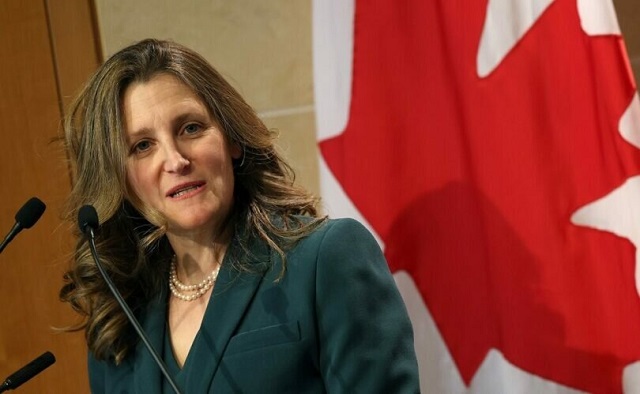
 Housing18 hours ago
Housing18 hours agoTrudeau’s 2024 budget could drive out investment as housing bubble continues
-

 Business2 days ago
Business2 days agoMaxime Bernier warns Canadians of Trudeau’s plan to implement WEF global tax regime
-

 Alberta2 days ago
Alberta2 days agoAlberta moves to protect Edmonton park from Trudeau government’s ‘diversity’ plan
-

 Bruce Dowbiggin2 days ago
Bruce Dowbiggin2 days agoCoyotes Ugly: The Sad Obsession Of Gary Bettman
-
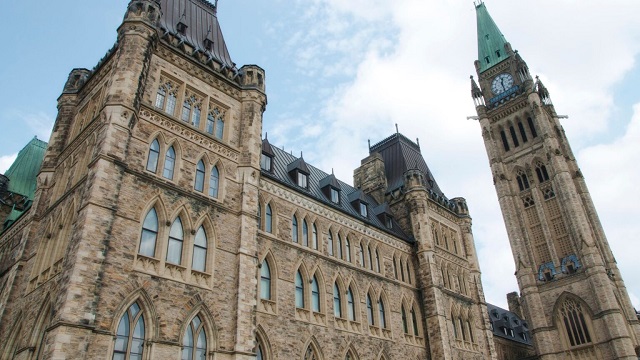
 Freedom Convoy1 day ago
Freedom Convoy1 day agoOttawa spent “excessive” $2.2 million fighting Emergencies Act challenge
-

 Brownstone Institute1 day ago
Brownstone Institute1 day agoA Coup Without Firing a Shot
-

 COVID-191 day ago
COVID-191 day agoWHO Official Admits the Truth About Passports






